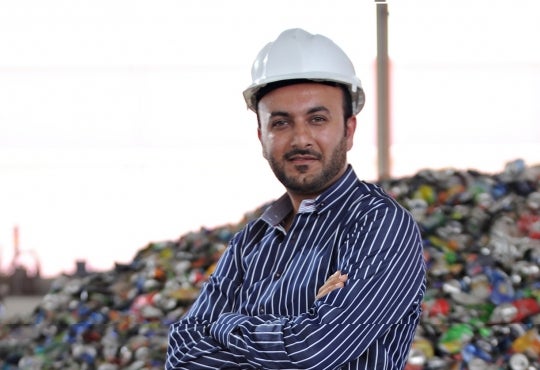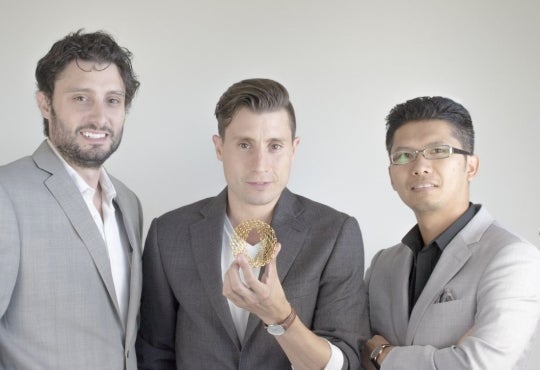Yueu Majok (BES ’13) is one of the University of Waterloo’s first graduates of the World University Service of Canada (WUSC) Student Refugee Program offered at Waterloo in partnership with the Federation of Students. The WUSC program has helped refugees from 37 countries including Kenya, Malawi, and Syria to settle in Canada and get an education at a Canadian university.
Yueu was displaced from Sudan to the Kakuma Refugee Camp in Kenya because of the second Sudanese civil war, living in the refugee camp for 14 years.
After undergoing a rigorous interview process, Yueu came to the University of Waterloo through WUSC in 2008 and lived in St. Paul’s University College from 2008 to 2010.
Alumni Relations had the opportunity to catch up with Yueu and ask him about his story.
--------------------------------------------------------------------
Can you tell us about your journey coming from the Kakuma Refugee Camp in Kenya to the University of Waterloo?
It was the most exciting journey of my life. After 14 years of living in a refugee camp, I knew no other way of life. I was 8 years old when I left my home with my parents and siblings. When I learned that I was coming to Canada, it filled me with hope and fear at the same time. It filled me with hope because it gave me a new direction, a way out of a refugee camp and out of a refugee’s life, which was a rare opportunity to get. It filled me with fear because everything about this journey was strange, unknown and new.
Many questions raced in my mind. How would I talk to people when my English was poor? How would I make a living? Would I get a job? What if I was unsuccessful at school? Would I ever see my family? Even though these questions were on my mind, the excitement that came with such an adventure was undeniable and I had to do it.
Can you tell us about the interview process you went through to be offered the scholarship to come to Waterloo?
Since the very first time I went into a grade one class, I had no idea that education could bring so much change in my life. I only went to school because all the other kids were going. It was like that until I went to high school, where I learned that if I got good grades, I could get a scholarship to a Canadian University and resettlement to Canada. A scholarship to a university was the best offer any refugee could ever dream of. Like every other kid going through high school at the time, I had a goal. It was to get good grades and get that scholarship.
After I graduated, I learned that at least a hundred students apply every year and only 25 make it through.
I applied in March 2006 and passed the English examination to make it among the best 40. But I did not pass the interview for the final 25. So I decided to go back to Sudan. Later, a friend who had passed the test and came to Canada that year gave me a call and told me to give it another try. It took me some time to convince myself, but I came back in 2007 and went through the process again and this time, I barely made it, but I did.
What did you find the most challenging during your transition to Canada?
The most challenging thing I experienced after the first few days of my arrival in Canada was my poor communication abilities. People had difficulty understanding me but above all I had the most difficulty understanding them. It affected me in group meetings, class presentations and conversing with friends.
Making friends in Canada was also challenging for me. When I was in Africa, I never had to make friends. In South Sudan, your closest neighbor is more related to you than someone far away. You grow up around cousins or people with some kind of relationship to you. Even after moving to Kenya in 1994, we had relatives who fled South Sudan settling with us and so there was family around me all the time. After I moved to Canada in summer 2008, It was the first time in my life I did not have that support.
St. Paul’s University College was a perfect place to start living in Canada. Living there gave me all the exposure and experience that I needed in the very beginning. The support from friends I met there and the staff that helped me through university.
You now live in Calgary and worked for Grizzly oil, can you tell us about this and what your role there was?
I landed my first job in May 2014 with Grizzly Oil Sands providing my Geomatics skill set to support their SAGD project initiative in Northern Alberta. I was based in the head office in Calgary working for the land and geoscience departments. My job was to answer to all Geospatial matters related to their assets and business as well as maintain GIS data and use it to create products such as maps and other kinds of charts. It gave me a glimpse of the corporate world and the energy industry in Alberta.
The University of Waterloo has asked our student refugee partner agency World University Service of Canada to increase Waterloo’s intake of refugee students next year, dedicating the increase to Syrian refugee students who wish to attend the University of Waterloo or any of our four Affiliated and Federated Institutions.






